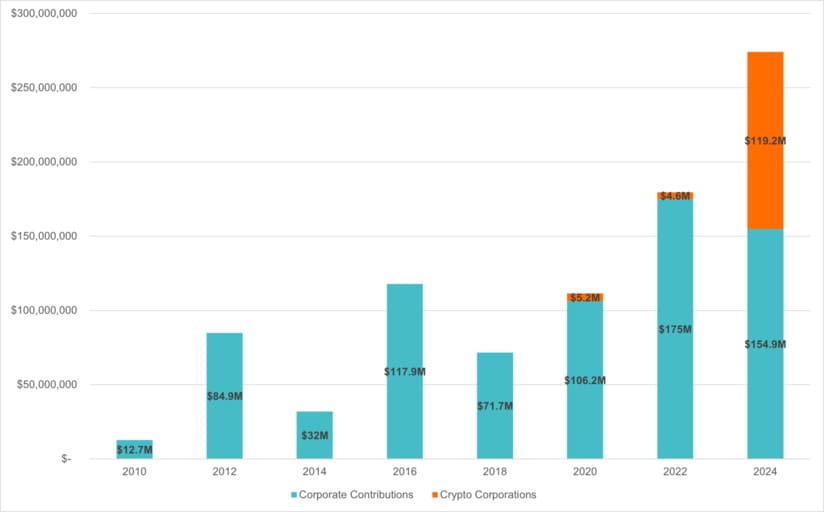TL;DR
- The crypto industry has invested over $119 million in the 2024 elections to support pro-crypto candidates, with Coinbase and Ripple leading the donations.
- Some controversy has arisen over corporate influence in politics.
- Since 2010, the crypto sector has contributed $129 million in political donations, representing 15% of all corporate spending on federal elections.
The crypto industry has fully immersed itself in U.S. politics through a significant investment in the 2024 elections. Two major sector companies, Coinbase and Ripple, have allocated over $119 million to support candidates who favor pro-crypto regulations. This capital injection aims to influence regulatory frameworks and the future of the industry.
Most of these funds have been directed to super PACs, with Fairshake PAC being the primary beneficiary. This committee has received a total of $202.9 million in contributions, of which $107.9 million come directly from crypto companies. These investments seek to support favorable candidates while countering those who are skeptical of the sector.
Coinbase has contributed approximately $50.5 million, with $45.5 million allocated to Fairshake PAC. Ripple has contributed $49 million, with $45 million also directed to this committee. Additionally, donations have been made to Fairshake affiliates and PACs from both Republican and Democratic parties, diversifying the impact of their funding.

Coinbase and Ripple Aim to Shift Election Outcomes in Favor of the Industry
The funding strategy has sparked controversy, mainly due to the alleged disproportionate influence that large corporate interests can exert on politics. Brian Armstrong, CEO of Coinbase, has stated that money is crucial in politics, acknowledging that large sums of money can change the course of elections.
The influence of crypto money is reflected in primary results. Industry-backed candidates won 36 of the 42 races they participated in. This overwhelming success has led some politicians, such as Donald Trump, to adjust their stances and present themselves as advocates for cryptocurrencies. Similarly, the Democratic political landscape appears to be considering a more lenient approach.
Since 2010, crypto sector contributions have totaled $129 million, accounting for 15% of all known corporate expenditures in federal elections, only surpassed by the fossil fuel industry. This high level of investment underscores the growing importance of the crypto sector in U.S. politics. The results will be awaited in November and beyond.










